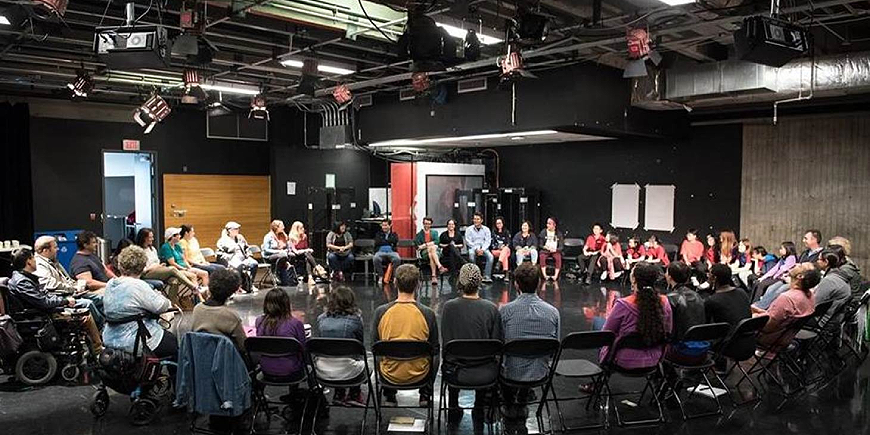
This semester, I interned as the Assistant Stage Manager for Alley Theatre’s production of Ridiculous Darkness. Alley Theatre is an award-winning Vancouver-based theatre company which strives to produce diverse, relevant, and empowering stories that are not usually told, and which seeks to engage the audience and the community in new and innovative ways.
Ridiculous Darkness was exactly the kind of ambitious and socially relevant project that Alley Theatre excels at. Adapted from a German radio play by co-producer and actor Daniel Arnold, the play attempted to determine our role in the horrors happening in the world and here in Vancouver, and, in some ways, to take responsibility for them. It involved seven local community groups, including the DTES Street Vendors Society, East Van Pow-Wow, andTheatre Terrific. The show had a cast of 46, including 6 core cast members, 38 ensemble members, and two live birds.
My job was to assist the stage manager (Anthony Liam Kearns) during rehearsals, and to manage the cast and crew backstage during shows. During the rehearsal period, I was primarily in charge of tracking props and set movements as well as actor entrances and exits; being ‘on-book’ (that is, following along in the script in case an actor forgot a line); preparing the set and props for whichever scene or act we were rehearsing; and, most glamorously, making coffee. During the show, I led my stagehands in pre-setting props and set in the appropriate places; moving them when they needed to be moved; cueing cast entrances; and generally managing the 46-person cast backstage. I was also responsible for quickly and discreetly finding a way to fix anything that went wrong – for example, if a shin light was kicked by a cast member; if a curtain clip covering an entrance came undone; or if we had to switch birds at the very last minute, right before the cue to enter – all of which happened during the show run. In sum – while the stage manager made sure that the show was technically perfect, and the actors made sure it was emotionally perfect, I made sure that it was logistically perfect – and together we created a fantastic, immersive experience for the audience.

One of the things I learned about myself from this semester is that I never want to keep this kind of schedule again. The show itself was amazing, and was surprisingly not stressful – my production team and my stage manager were great at keeping everything on schedule and creating a supportive and calm atmosphere. What made the process difficult for me was that I was also taking a 400-level history class and a 300-level sociology class, both of which were very reading- and writing-intensive. I was also trying to pick up whatever work shifts I could fit into my rehearsal schedule. However, this meant that I had no time to cook, exercise, relax, clean, read, see my friends, or go out for most of this semester. I sincerely enjoyed everything that I was doing – my classes were interesting, the show was great, and I like my work – but I was also exhausted and not taking proper care of my mental health. My wish-list for the end of the semester was to sleep for a week, clean my bathroom, and see my friends – in that order… and when ‘clean your bathroom’ makes your wish-list (ahead of seeing friends, to boot), you gotta reconsider your life choices a little.
Ultimately, this internship fit perfectly with my learning objectives at this point in my career, and has paved the path for scale-jumping in the future. Although I have been stage managing for several years now, I have never worked on a project of this magnitude. Thus, I filled in some gaps in my practical experience, developed new professional relationships, and learned where my work/life balance needs to lie. I also reinforced my desire to be a professional stage manager following graduation. Following some insightful conversations with my production team, my new plan is to spend the next year working as much as possible as a stage manager and technician, and to reevaluate again next December to see how far I’ve come and how happy I am in this industry.
The more projects I work on, and the more time I spend talking to other people in this industry, the more apparent it becomes that there is no single path to success in theatre. Everyone comes from a different background. Some went to school for years; others never went to school at all; and many, like myself, went to school for something entirely different. Sometimes people leave the industry and never come back; other times they return, years later, with an entirely new creative perspective. What matters is finding a lifestyle and a community that works for you and that makes you happy. For myself especially, as someone living with a mental illness, comparing myself to others or attempting to find the ‘right path’ is counterproductive. What I need to do is use experiences like this one to grow my theatre family, learn my strengths and weaknesses, and continually reevaluate how I feel so that I can find a fulfilling and comfortable lifestyle that works for me.
Beyond the Blog
-
To learn more about opportunities like Diane's visit the School for Contemporary Art's homepage.













